
The scene opens with a sense of confusion as the camera zooms in too closely on President Donald Trump's face. The table, where a group of tech executives is seated, appears excessively long. Among them are tech titans like Mark Zuckerberg, Bill Gates, Tim Cook, Satya Nadella, and Sam Altman—a veritable who's who of Silicon Valley's most influential figures. These cutthroat competitors have gathered to pledge their allegiance to Trump during a dinner that is both unusual and revealing. The event took place in the State Dining Room of the White House and was partially broadcast on C-SPAN.
True to form, Trump’s introduction was both lavish and perplexing. “It's an honor to be here with this group of people. They're leading a revolution in business and in genius and every other word,” he proclaimed. As the dinner progressed, the pandering began in earnest, highlighting the dynamic of the evening. This gathering marks the culmination of months of Big Tech executives cozying up to the Trump administration, showcasing their willingness to align with political power.
One by one, Trump queried the executives about their investments in the United States, and each responded with glowing praise for his leadership. This scene mirrored previous gatherings with cabinet members, where powerful figures contorted themselves to win favor with the president. However, the atmosphere felt particularly eerie, as if everyone was taking turns to express gratitude to a distant relative at a family gathering. “It’s going to be something like $600 billion through ‘28,” Zuckerberg stated regarding Meta's domestic infrastructure investments. Sergey Brin even congratulated Trump on his approach to Venezuela, just two days after a controversial drone strike resulted in numerous casualties. Meanwhile, the praise for the administration’s AI policy flowed freely.
Microsoft CEO Satya Nadella specifically commended First Lady Melania Trump for her leadership in promoting “skilling and economic opportunity that comes with AI.” This acknowledgment came on the heels of her recent launch of the Presidential Artificial Intelligence Challenge. Both Google CEO Sundar Pichai and AMD CEO Lisa Su echoed similar sentiments about the administration’s AI initiatives. “I want to thank you for setting the tone such that we could make a major investment in the United States,” Cook remarked, referencing Apple’s commitment to invest $600 billion in US manufacturing. However, this investment was made under the looming threat of hefty tariffs on smartphones, creating an uncomfortable juxtaposition.
The most enthusiastic endorsement came from Oracle CEO Safra Catz, a former member of Trump’s transition team. “You've unleashed American innovation and creativity,” she proclaimed, attributing the current climate to Trump's administration. After a light-hearted joke about his rumored demise, Trump opened the floor to questions from the media, creating an atmosphere ripe for scrutiny. A notable moment occurred when Zuckerberg raised an eyebrow at a fellow attendee, hinting at underlying tensions despite the public displays of camaraderie.
Trump’s love for a meticulously arranged seating chart was evident, with Zuckerberg positioned directly to his right and Gates next to Melania Trump on the left. Sergey Brin and his partner, Gerelyn Gilbert-Soto, sat directly across from the president, a placement laden with significance. Gilbert-Soto has been known for her vocal support of Trump, even making controversial statements on social media. According to etiquette guidelines, seating arrangements often reflect the host's perception of rank, which could explain why Nadella found himself seated farther from the president.
Notably, the guest list lacked some of the tech industry's heavyweights, including Elon Musk, Jeff Bezos, and Jensen Huang of Nvidia. Their absence raises questions about whether they were uninvited or had prior commitments. The dinner’s dialogue also revealed who had the opportunity to speak, with OpenAI CEO Sam Altman taking the floor while Meta’s Alexandr Wang did not. Topics such as immigration, essential to the tech industry, were conspicuously absent from the conversation, as were discussions about the potential impacts of tariffs on consumer technology prices.
The relationship between the average citizen and Big Tech has often been summarized with the phrase that “you are the product.” However, as the most powerful executives in America continue to align themselves with a president who is seen as undermining democratic foundations, a new axiom may be emerging: the only principle is power. This dinner not only highlights the cozy relationship between Big Tech and political power but also underscores the complexities and challenges facing the industry in the current socio-political landscape.